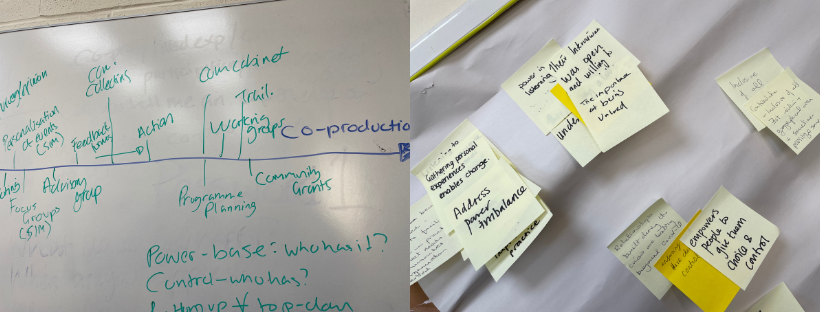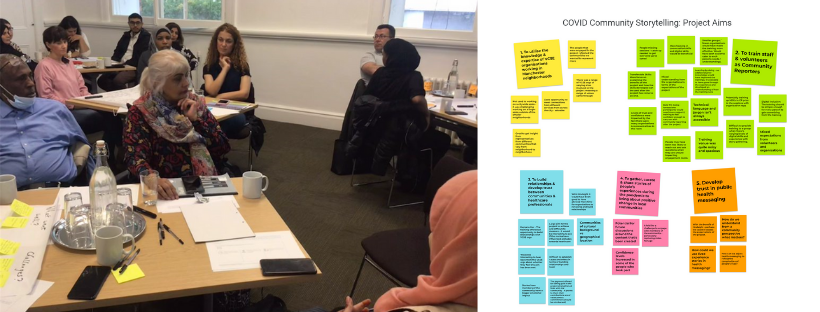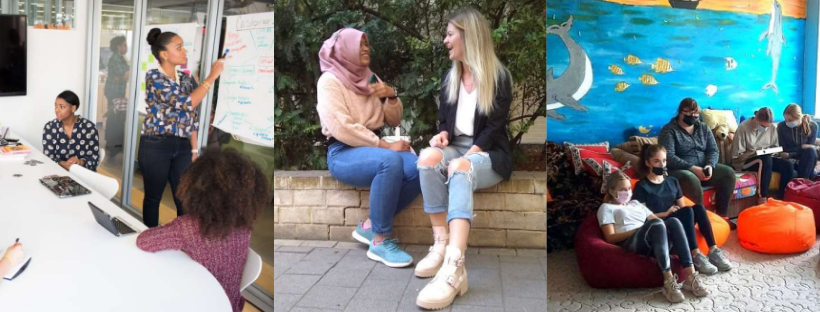The CONTINUE project supports young people experiencing social exclusion to tackle the specific challenges COVID-19 in terms of staying connected and integrated into European communities. The project is being delivered by 8 NGOs from different European countries who are experienced in youth education and community based activities. The work involves storytelling, social action projects, policy development, knowledge exchanges, an outreach campaign and the creation of an online platform. As part of the CONTINUE project, each partner organisation has delivered a series of story gathering and curation workshops with young people from varying locations across the UK and Europe. The findings of the workshops have fed into the creation of a series of insight reports which provide an overview of young people’s experiences of the COVID-19 Pandemic. In the UK, People’s Voice Media worked with young people at Gorse Hill Studios in Stretford, Greater Manchester and the key findings cover a range of topics including education, social media, mental health and wellbeing.
Education
“I was terrified to go back to school because I’ve missed all the work.”
The transition to and from online and in-person education was challenging for young people to adapt to. Some felt being at home provided a better space for concentration and focus due to fewer distractions, whereas others struggled with finding the self motivation required when studying from home. Lockdown meant that young people had more free time to spend at home, some used this time to complete homework, whereas others focussed on developing new skills and hobbies. Overall there were mixed feelings about how COVID-19 had impacted the young people’s experiences of education, some were less bothered about what they had missed out on, as they didn’t enjoy school with some feeling happy about not being there. Others found being away from school stressful as they were concerned about catching up on work and wanted to know when things would go back to what they were used to. When lockdown restrictions were lifted, most young people felt happy to be back in school, particularly when they reunited with friends, although social distancing took some time to adjust to. Wearing masks and remembering the rules was difficult at times and there was a sense of panic around returning to school with restrictions still in place. Young people also reported how they struggled with behaviour when returning to school, highlighting how they had previously been kicked out of school for bad behaviour. From these findings it is clear that young people would benefit from more support with transitioning in and out of the different learning environments that have been created as a result of COVID. Additional help would minimise stress and ensure young people feel as though they are keeping up with work, particularly those who struggle with self learning, concentration and behaviour. More awareness and understanding of the potential panic caused by changing restrictions would be beneficial as the situation around COVID continues to evolve.
Social media
In an ever more secluded environment, social media provided a means of keeping in touch with friends and family and staying connected with the outside world. However as time went on, many young people began to feel frustration towards connecting with people online. One young person felt social media provided a valuable means of escape:
“I immersed myself into a creative world and understood others’ worlds by withdrawing from social events.”
In embracing social media they found a sense of self they hadn’t discovered prior to the Pandemic. Nevertheless in their story they highlight how social media can easily become a toxic environment, particularly when the focus shifts to gaining and maintaining a following. Allowing young people to explore their relationship with social media and realise the potential benefits and harmful effects is vital in ensuring they build a healthy connection with it.
Mental health and emotional wellbeing
“After COVID I lost a part of myself, but gradually I’m finding them.”
Young people’s mental health and emotional wellbeing was heavily impacted by COVID-19 and the consequential lockdowns and restrictions. There was a significant number of stories which referenced how stress levels were heightened throughout the pandemic, particularly due to fears around restrictions constantly fluctuating. The continual disruption to young people’s routines and daily lives, combined with being instructed to stay at home caused stress levels to rise, as did the ongoing news broadcasts and updates and the expectation to continue with school work. Boredom was another common emotion experienced by the young people during the pandemic. Although they had extra free time to spend relaxing and doing hobbies with some appreciating the time to recuperate and understand their emotions, many felt trapped having to stay inside. The lack of interaction with people outside of the home contributed to feelings of depression, isolation and loneliness and whilst social media provided a means of staying in touch, it felt more distant than in-person communication. In one case a young person’s social anxiety worsened as they felt they started to forget how to communicate with people. Some storytellers report a rise in confidence levels whilst others felt it was reduced, but what is clear is that the majority struggled with maintaining their mental health and wellbeing. The feeling of being pushed into a new environment without feeling prepared for change causes panic and worry – more support is crucial in order to provide young people with coping strategies for dealing with traumatic experiences such as COVID.
The key learning from the stories include:
- Education: More flexibility and support for young people when adjusting to new learning environments would minimise the impact on their education and ensure they feel confident in their ability to keep up with work.
- Attitudes toward lockdown and restrictions: The production of clear, concise and accessible information specifically catering to young people with regards to the implications of the pandemic would make it easier for them to abide by restrictions and feel more informed.
- Mental health and emotional wellbeing: Young people need to be equipped with effective coping strategies for dealing with traumatic experiences such as COVID-19 to minimise the risk of poor mental health and emotional wellbeing.
- Social media and connections: Young people should be provided with a supportive learning space to explore their relationship with social media and the potential benefits and harmful effects it can have
- Building bonds: People working with young people need to be observant and aware of young people’s ability and desire to speak out for support to help prioritise their safety and wellbeing.
- Routines and daily habits: Young people have demonstrated a huge level of resilience to the constant disruption caused by the pandemic. The breakdown of routine can have a negative impact on young people’s mental wellbeing as can the lack of rest – would it be possible to give them more control over their routines and daily habits?
The content of this article is based on an insight report produced by People’s Voice Media as part of the CONTINUE project and includes key findings from 15 stories gathered from young people living in Stretford, Greater Manchester in the UK. All of the stories from young people that have been gathered on the project so far can be listened to on the Community Reporter Website here.




